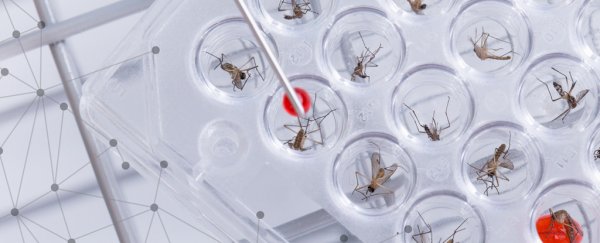In a new statement outlining its strategic response to Zika virus, the World Health Organisation (WHO) has acknowledged that it's looking at "novel approaches" to control mosquitoes known to spread the infection, including research into genetically modified (GM) insects.
As part of its efforts to improve vector control of Aedes aegypti mosquitoes, WHO has confirmed it's considering research into a gene drive. If successful, a gene drive could ultimately overtake populations of mosquitoes in the wild with genetically modified insects rendered incapable of spreading Zika virus.
Given the stark situation we're facing with Zika – which has been declared a global health emergency by WHO – creating mosquitoes that can't infect people might be an effective way of stopping the virus. But at the same time, it's a decidedly controversial action, with the potential to fundamentally alter or even wipe out an entire species.
"There are a range of vector control measures for the mosquitoes known to spread the Zika virus," WHO notes in its just-released Strategic Response Framework. "Recent developments, such as progress in mosquitoes modified to carry Release of Insects with Dominant Lethality (RIDL) traits or the use of gene drives, [offer] opportunities for novel approaches."
Previous trials with GM insects have shown that Aedes aegypti mosquito populations can be reduced by as much as 90 percent.
"I think a role out of GM mosquitoes could stop this very quickly indeed," Hadyn Parry, CEO of British genetics firm Oxitec, which ran one of the trials, was reported as saying. "We're expecting to get the go ahead very soon and then this could make a real difference."
In addition to investigating genetically modified mosquitoes, WHO says it is conducting research looking at the effects of introducing Wolbachia bacteria into Aedes aegypti mosquito populations, which would have the effect of preventing mosquito eggs from hatching after females mate with males carrying the bacteria.
Another way of suppressing mosquitoes could be sterilising male mosquitoes with low doses of radiation, a technique called Sterile Insect Technique (SIT).
While these are all only options on the table at the moment, it's conceivable that some of these strategies may very well be used to contain the Zika virus – and possibly sooner rather than later.
"WHO encourages affected countries and their partners to boost the use of current mosquito control interventions as the most immediate line of defence," the organisation said in a statement, "and to judiciously test the new approaches that could be applied in future."
